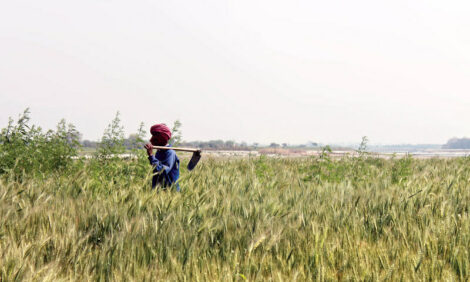



Supermoms Against Superbugs Storm Washington
US - Mothers from Maine to Hawaii gathered in Washington, D.C. to press the Obama Administration and Congress to do more to rein in the overuse of antibiotics on America's industrial farms, a practice that breeds antibiotic-resistant bacteria.The visit is organized by the Pew Campaign on Human Health and Industrial Farming and the American Academy of Pediatrics, two organizations advocating for reductions in the use of antibiotics in meat and poultry production.
"For the health of our families and future generations, we cannot keep using antibiotics to compensate for overcrowding and unsanitary conditions in the livestock industry," said Cindy Madsen of Madsen Stock Farm. "We have been raising chickens without antibiotics for about 25 years and hogs for about 10 years. Our customers, who total more than 1,000 buyers in central Iowa, want meat raised without antibiotics. We know it can be done."
"In supermarkets and in restaurants, consumer demand for meat and poultry raised without antibiotics is growing," said Mary Sue Milliken, co-owner and chef of Border Grill restaurants. "People want to know the food they're eating and feeding to their families was produced without putting the public's health at risk."
"As a pediatrician, I've seen first-hand how a child's health depends on the availability of effective antibiotics," said Dr. Cecilia Di Pentima, a pediatric infectious diseases consultant at Monroe Carrel, Jr. Children's Hospital at Vanderbilt University. "Pediatricians are already limited in the number and types of antibiotics we can use to care for ill children, and we cannot effectively care for the most vulnerable children without efficient antibiotic treatments. The emergence of antibiotic resistance leaves some of our sickest young patients without life-saving treatment options. Our nation's leaders must help end the overuse of antibiotics on industrial farms and protect children's health."
"Eight years ago, I lost my one-and-a-half year-old son Simon to an antibiotic-resistant infection," said Everly Macario, co-founder of the MRSA (methicillin-resistant Staphylococcus aureus) Research Center. "Every time we use an antibiotic, we risk creating a superbug. Sometimes, when people or animals are sick, we must tolerate that risk and use those drugs to fight infection. But we cannot afford to throw these drugs around industrial farms simply to rush a healthy pig or chicken to reach slaughter weight."
About 80 per cent of US antibiotics are sold for use in food animal production. In 2010, officials from FDA, the US Department of Agriculture, and the Centers for Disease Control and Prevention testified before Congress that there was a definitive link between many of these practices and the crisis of antibiotic resistance in humans.
As antibiotics lose their effectiveness, infections will become more difficult to treat, more costly and increasingly deadly. According to a task force led by the Centers for Disease Control and Prevention, the US Food and Drug Administration and the National Institutes of Health, antibiotic-resistant bacteria could render diseases like pneumonia, meningitis and tuberculosis untreatable.
On 11 April, FDA proposed measures to restrict the use of antibiotics to make food animals grow faster and to increase veterinary oversight of these practices. The Pew Campaign on Human Health and Industrial Farming, the American Academy of Pediatrics and other medical and public health organizations are pressing the agency to strengthen the proposed guidelines to ensure that these drugs will be permitted to be used only in the presence of microbial disease (or exposure) and will not be allowed to compensate for the effects of unsanitary and overcrowded conditions.
To ensure human antibiotics work needed, many of these organizations also are urging Congress to pass the Preservation of Antibiotics for Medical Treatment Act (H.R. 965, S. 1211).
TheCattleSite News Desk


